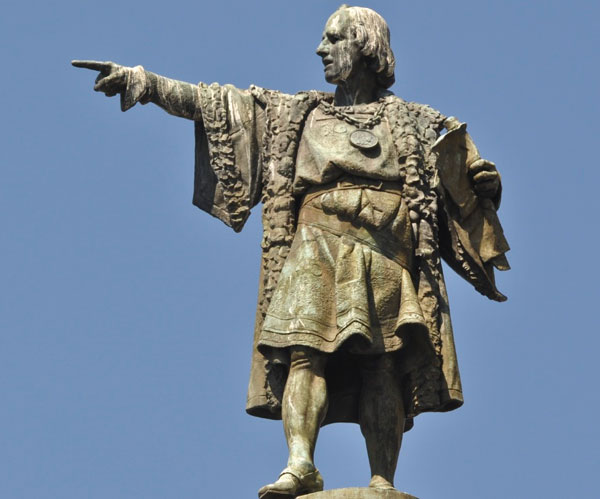Columbus was not the first to find America?
A finding worth equaling Dan Brown's novel has helped clarify the journeys of John Cabot, Italian explorer and marine, showing that he has knowledge of European journeys. to 'New World' before Christopher Columbus actually explored America in 1492.
>>>4 paranoia about Christopher Columbus
Although still recognized as an American discoverer, Christopher Columbus only arrived in the continent of the New World in 1498 by train to South America. In North America, Cabot was the first European since Leif Ericson and the Vikings landed in North America with three trips to King Henry VII of England in the summer of 1496 - 1498. The expedition Cabot's second insurance was implemented in 1497 to help Europe discover North America - in Newfoundland Island (meaning the newly found land) in present-day Canada.
Now, research on the yellowed book reveals a surprise about Cabot's expedition: In April, Italian explorer received support from an Italian bank - Bardi bank. London. The note shows that Europeans may have found the New World for decades before both Cabot and Columbus set sail.

Who first set foot on America?
'The short note opens a whole new chapter in Cabot's understanding. It shows that European expeditions are part of the Italian-funded expedition system , " said historian Francesco Guidi-Bruscoli of the University of Florence.
Guidi Bruscoli describes in detail this discovery in the Historical Research journal, which states that the short note mentions: 'new land' ("il nuovo paese") and not ' a new land '("un nuovo paese") .
The use of il (the in English) article and not un (a in English) is really a confusing thing. The phrase may imply that the money was given to Cabot so that he could find a land where its existence had been known before. Maybe Bardi Bank gained significant economic benefits, so it financed an almost certain expedition.
Since Cabot's royal certificate is only applied to lands that 'Christians are unknown' , it is unlikely that the 'new land' here is exactly the land Columbus had found before. year. Therefore, the note may indicate the statement of British traders that they discovered North America before Columbus was right.
'Unfortunately, we only have a few clues. This note implies that Bardi bank believed in the previous expedition, but we cannot assume that such an expedition really happened, " said Guidi-Bruscoli.
This point is reinforced by a letter written in the 1497 winter by a British businessman named John Day to 'Lord Grand Admira' - almost certainly Christopher Columbus. The letter discovered in the 1950s refers to Cabot's completed 1497 expedition to Newfoundland, but before that British men 'found and discovered that land in the past' .
The evidence is found in the database of historian Alwyn Ruddock - a leading expert on British expeditions.
According to Evan Jones, a historian at Bristol University, Ruddock's document "promises to revolutionize our understanding of European participation with North America three decades later in 1492".
For example, Ruddock said that evidence was found in sources in Italian and Russian that British merchants arrived in New World sometime before 1470, and that Cabot did not die in the expedition in 1498 as many people thought, but he returned to England in 1500.
'She found unexpected discoveries, but she asked to cancel all her research after she died ,' Jones said.
This was done in 2005, when Ruddock died at the age of 89. Her unpublished work - consisting of 78 bags of notes, letters, photos, and movies - was all burned.
Ruddock also said that Cabot was funded by an Italian bank. In 2010, when invited to visit the home of a dead historian, Jones and researcher Margaret Condon discovered the source of this information on a piece of paper stuck to an old shoe cabinet, which referred to Bardi Bank. London.
'Bardi Bank - that's all we need to find out about the Italian bank Ruddock has kept secret for nearly a century,' said Jones and Condon to Fuidi-Bruscoli in Florence. Fuidi-Bruscoli later found a short note in the Guicciardini family's private database.
Reference: Discovery
- The Vikings found America before Columbus?
- 4 paranoia about Christopher Columbus
- People discovered America nearly 500 years ago Columbus
- The ancient Chinese discovered America before Columbus?
- Colombus was not the first to find America and the two controversial facts behind him
- Is it true that China found America before Columbus?
- Syphilis originated from Christopher Columbus?
- Did the Japanese find America 5,000 years ago?
- New discovery statement about the identity of Christopher Columbus
- The 10 most interesting mysteries of lost civilizations (Part 2)
- Found the wreck of Christopher Columbus after 500 years
- How did the total eclipse save Christopher Columbus's life?
 'Fine laughs' - Scary and painful torture in ancient times
'Fine laughs' - Scary and painful torture in ancient times The sequence of numbers 142857 of the Egyptian pyramids is known as the strangest number in the world - Why?
The sequence of numbers 142857 of the Egyptian pyramids is known as the strangest number in the world - Why? History of the iron
History of the iron What is alum?
What is alum? US million dollar guns from meteorites billions of years
US million dollar guns from meteorites billions of years 